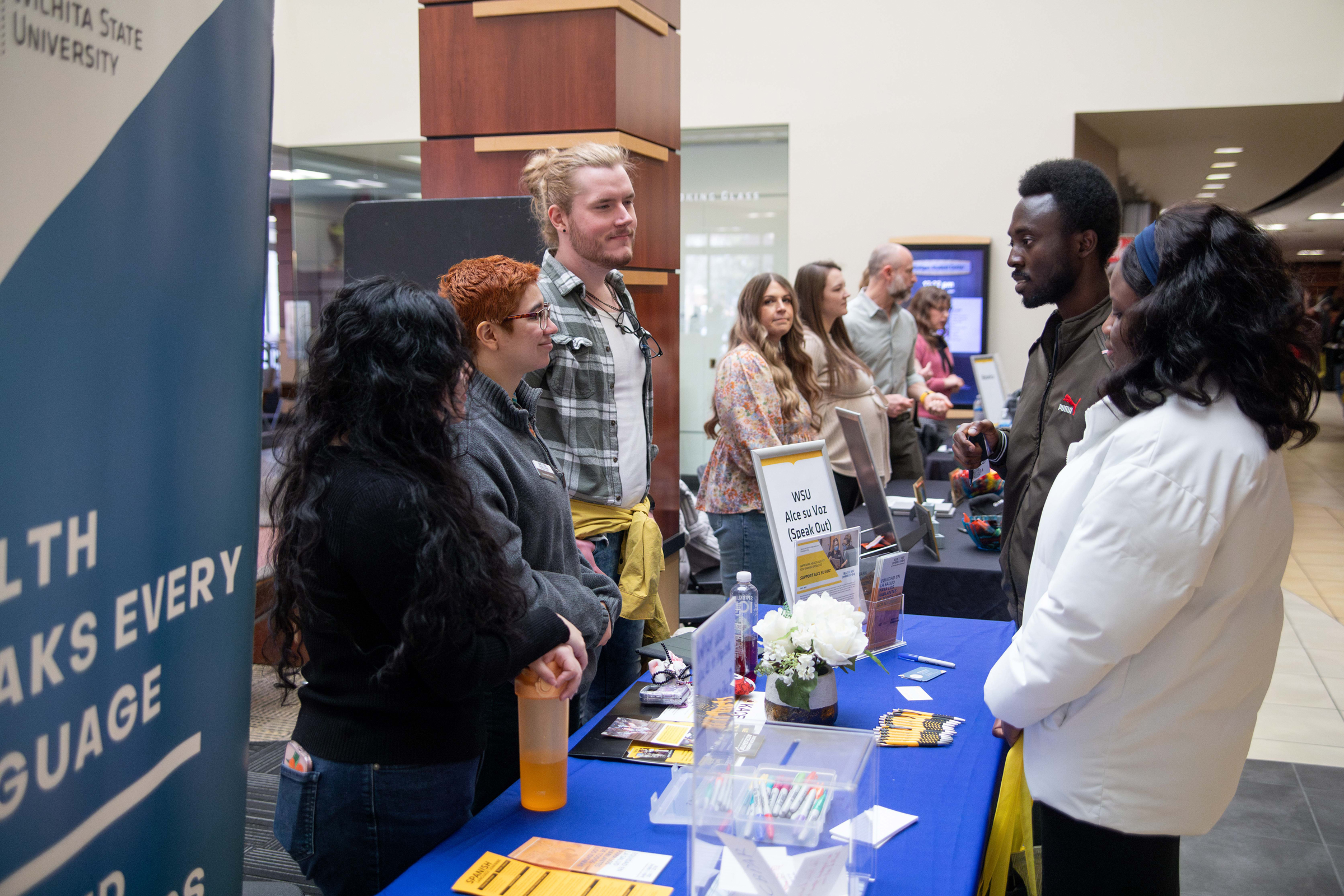By Rachel Showstack
Many of our readers may have seen the news that Wichita State’s president Rick Muma just published his new book Student Centered, Innovation Driven about our university’s transformation into a national model for applied learning, research, and industry collaboration. To recognize this milestone, I’d like to take a moment to reflect on the applied learning experiences that Alce su Voz, a program in Wichita State’s modern language department (MCLL), has been able to provide through our innovative model of community-engaged research. The learning that takes place in programs like ours, where team members collaborate to impact health outcomes and well-being in Kansas communities, prepares students for careers in a variety of fields while they also develop identities as leaders and changemakers.
Take Physician Associate graduate student Gabriela Aguilar, who has worked with Alce su Voz since 2023. Gabby joined our team when she was an undergraduate student in the Exercise Science program who wanted to learn how she could prepare to serve Kansas’s linguistically diverse communities as a future health care professional. When Gabby joined the team, she thought that she would be focusing primarily on patients whose first language is Spanish, since she grew up interpreting for her Mexican Spanish-speaking parents at their health care visits. However, she soon learned that as a clinician with cultural humility, she had the potential to improve the healthcare experiences of people from a range of different linguistic backgrounds.
In a poster presentation that she delivered for the annual meeting of the National Association for Medical Spanish and the Medical Organization for Latino Advancement, Gabby wrote “My growing knowledge of language-competent care allows me to help around 5,000 more patients who speak Mayan languages.” She was referring to the Indigenous community members from Guatemala who live in several counties across southern Kansas and speak languages that were present in Guatemala before the Spanish colonization of the region, like speakers of Akateko and Q’anjob’al in the rural Kansas town of Coffeyville.
Gabby’s primary role in Alce su Voz has focused on our media campaigns that publicize our events and educate viewers about healthcare language access. These campaigns have made our research on Kansas healthcare language access policies digestible for different audiences who share an interest in improving our state’s health outcomes.
Like Gabby, our Undergraduate Research Assistant Alec Schon is interested in improving policies and systems that make information and communication accessible for individuals with non-English language preference in the United States. Alec, who is majoring in linguistics with a concentration in computer science and data science, manages the Alce su Voz website and is working on a visual representation of our research on Mayan communities in Kansas using ArcGIS, a software that supports geospatial storytelling. Alce su Voz has allowed Alec to see how he can combine his passion for computer science and language access to improve systems of information dissemination for linguistically marginalized communities.
In his 2016 book Liberating Service Learning and the Rest of Higher Education Civic Engagement, Randy Stoecker encourages his readers to think critically about the value of having students serve as volunteers in charity organizations for applied learning experiences; instead, he encourages faculty to find ways for students to become involved in changing the systems that lead to poverty, poor health outcomes, and other challenges for certain groups of people.
In my presidential address for the 52nd annual meeting of the Linguistic Association of the Southwest, I explore the ways that Alce su Voz provides opportunities for the kind of applied learning experience called for by Stoecker. What is unique about the applied learning experiences offered in our program is that, whether students only have a rudimentary understanding of Spanish or they grew up speaking the language at home with their family, all the work that they do with us is related in some way to language, communication, and health, and thus is within the purview of the field of applied linguistics.
Since 2020, graduate and undergraduate students have contributed to the development and advancement of our program through practicum experiences, class-based service-learning projects, paid research assistant positions, and volunteer roles. In fact, the initial series of community meetings where it all started were organized by three graduate students who took an independent study course with me in Spring 2020 and then were hired on a grant that summer. Since then, we have included students from degree programs in Spanish, linguistics, public health sciences, health administration, exercise science, physician associate, community psychology, and film studies, many of whom have had the opportunity to work together and learn from each other.
This fall we are excited to welcome a new student to our team: Chloe Alcantara, a graduate student in public health with a dual focus on gerontology and health administration. Chloe brings an additional language to our team since in addition to being a native speaker of English and a second language learner of Spanish, she also learned Tagalog from her mom who is from the Philippines.
You can read more about Alce su Voz’s student impact in our 2024 Annual Report.
Alce su voz is a community-engaged program at Wichita State University whose mission is to improve health equity for speakers of Spanish and Indigenous languages in the United States, with a focus on Kansas and the Midwest. For more information or to get involved, please send an email to alcesuvoz@wichita.edu. You can also join our email list and follow us on Facebook, Instagram, LinkedIn, and YouTube.
